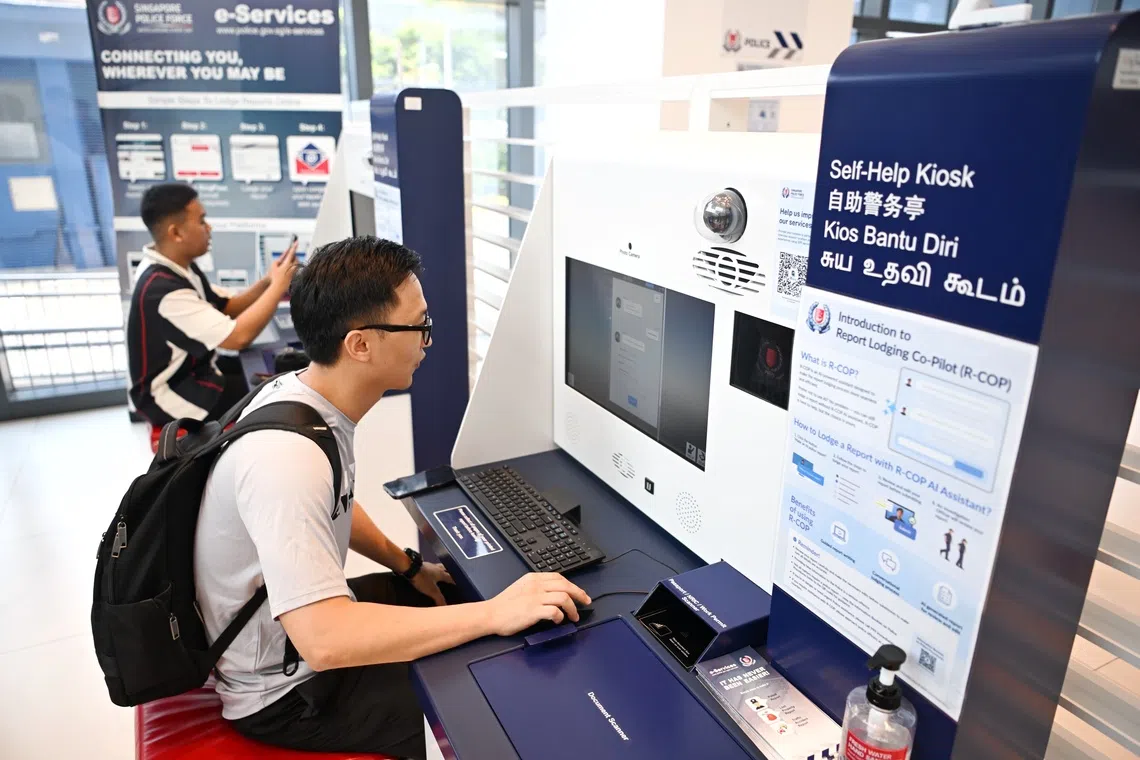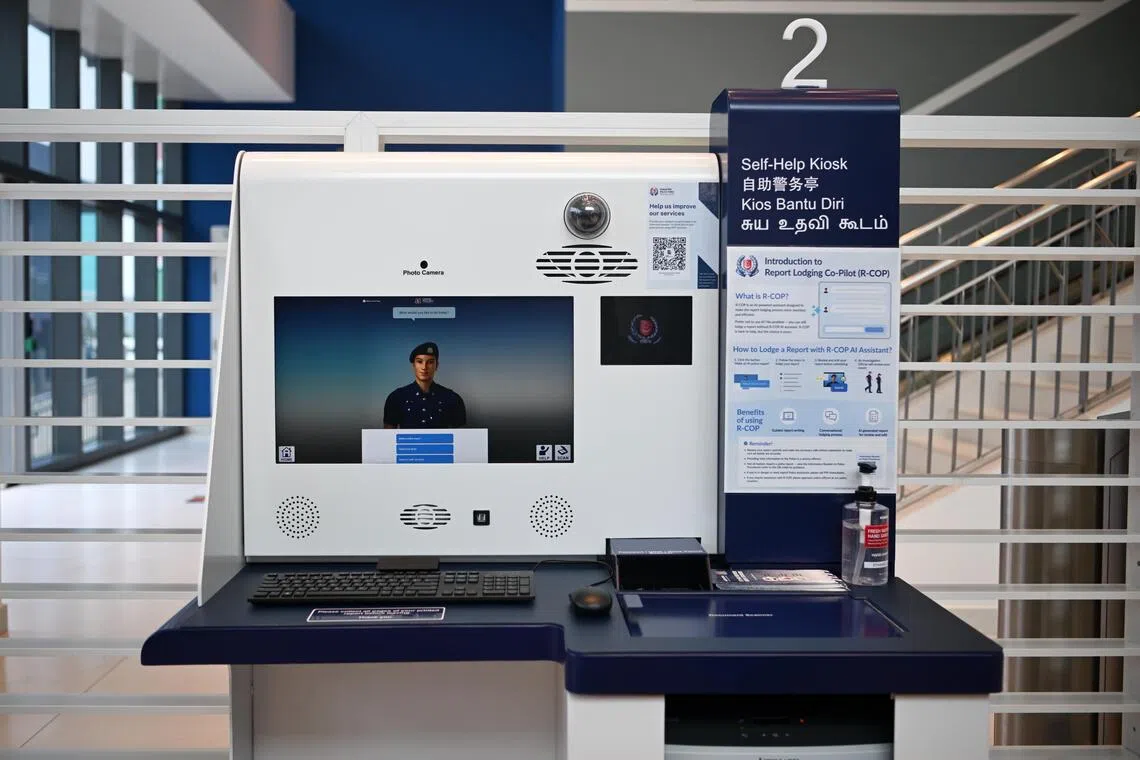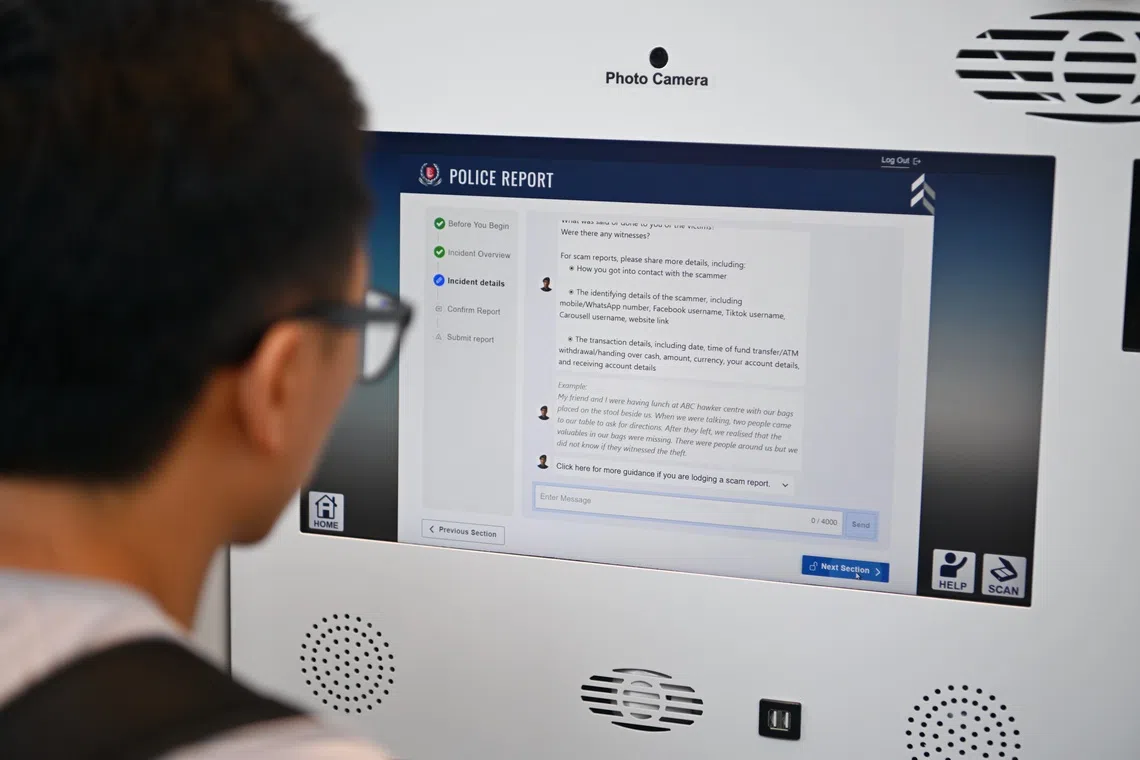New AI chatbot R-Cop will help public lodge clearer police reports to save time
Sign up now: Get ST's newsletters delivered to your inbox

The Report Lodging Co-Pilot, or R-Cop, will be available at nine police self-help kiosks by Oct 1.
ST PHOTO: AZMI ATHNI
Follow topic:
- Singapore Police will launch the AI chatbot R-Cop at self-help kiosks at Police Division Headquarters by Oct 1 to help the public lodge clearer reports.
- R-Cop analyses the incident description, prompts users for crucial details (like bank details for scams), and drafts a report for review, saving time.
- Developed by HTX, R-Cop aims to improve report quality and reduce police follow-up calls; users should review the generated summary carefully before submission.
AI generated
SINGAPORE - The police will be launching an artificial intelligence (AI) chatbot to help members of the public lodge clearer and more specific police reports to save time.
The Report Lodging Co-Pilot (R-Cop) is a system run by AI that will be available by Oct 1 at nine of the self-help kiosks situated across the seven police division headquarters.
The Woodlands Division Headquarters will have three R-Cop kiosks.
The other six division headquarters – Ang Mo Kio, Bedok, Central, Clementi, Jurong and Tanglin – will each have one kiosk with R-Cop available.
Members of the public can log in with Singpass
If they choose not to use R-Cop, they will be asked to provide a description of the incident or the offence they are reporting.
The system will then prompt them only for basic information, but this might result in them leaving out essential details such as phone numbers.
Investigation officers may then have to make follow-up calls for more information, taking up additional time of both the public and the police.
With R-Cop, the description is analysed by AI to identify the type of incident and what crucial or useful information might be missing.
The chatbot then prompts the person for the relevant details.
If the case involves a scam, R-Cop may prompt for details such as bank account and phone numbers.
If it is about a hit-and-run incident, it may prompt for details such as licence plate numbers and damage caused.
Once this information is gathered, R-Cop generates a draft report for review and editing before submission.
All data uploaded in the chat, including everything typed to R-Cop, is securely stored on government servers.

Members of the public can login with Singpass at the kiosks, and have the option to use R-Cop to file a report or do so digitally without using the chatbot.
ST PHOTO: AZMI ATHNI
The police said this data is safeguarded in accordance with public-sector cyber security and data security requirements.
Under the Personal Data Protection Act, organisations must ensure that the data of their customers and users is secured.
This includes having appropriate cyber security systems to detect suspicious activity, and preventing unauthorised access.
Organisations that fail in their obligations can be fined, like the Consumers Association of Singapore, which was fined $20,000 in 2024
Separately, there is also the Public Sector Governance Act
This law is more stringent in that it criminalises acts of unauthorised disclosure of data, misuse of data, and the re-identification of individuals from anonymised data.
Public officers found guilty of these offences can be fined up to $5,000 and face a jail term of up to two years.
Tests by The Straits Times on R-Cop found that it was able to understand common local colloquialisms before generating a report in clear English with elements of the incident in chronological order.
Assistant Superintendent of Police Alden Tan from the police’s operations department said: “With R-Cop, the police aim to improve the report lodging experience and ensure that critical information is captured upfront to reduce follow-up calls by the police.”
The chatbot, which is currently available only in English, was developed by the Home Team Science and Technology Agency (HTX).
It was first announced at the Police Workplan Seminar 2024
The police said that as with any AI system, there may still be occasional inaccuracies or unexpected responses.
To minimise this, the police and HTX said they ensured the system was subjected to rigorous testing.
Those who use R-Cop are advised to carefully review the summary it generates before submitting the report.

The chatbot, which is currently available only in English, was developed by the Home Team Science and Technology Agency.
ST PHOTO: AZMI ATHNI
Before 2004, police reports had to be manually written by police officers.
It was only in that year that the Frontline Officer’s Computerised System was rolled out, allowing officers to lodge reports digitally.
The police launched their e-services in 2005, enabling the public to lodge reports online, from anywhere, by themselves.
Self-help kiosks were introduced in 2013, and their services included lodging reports.
Those who do not wish to use the digital or self-help services can still approach police officers at the division headquarters and manually file a report with them over the counter.


